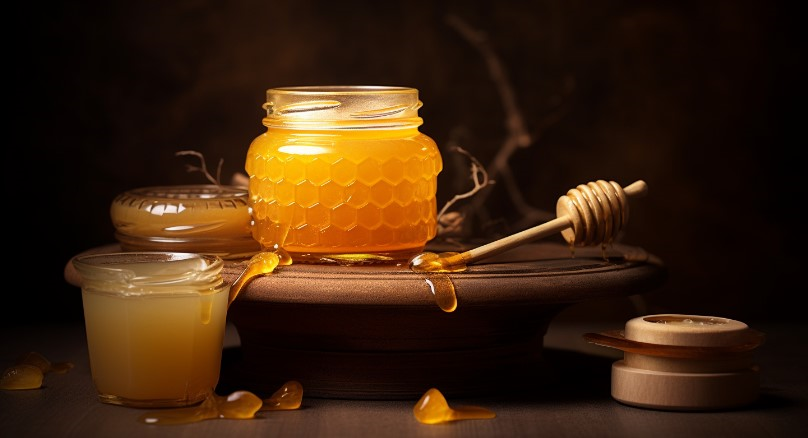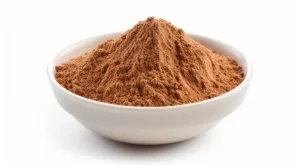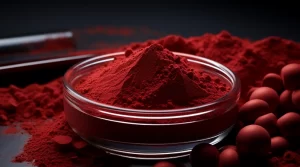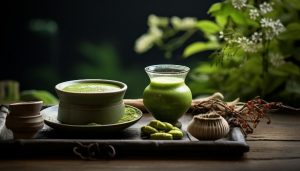Die Wirkung der Königinnenmilch

Was ist Königinnenmilch?
Die Königinnenmilch ist eine weiße oder gelblich-cremige Substanz, die von den Unterkiefer- und Rachendrüsen der Bienen abgesondert wird und die die einzige Nahrung der Bienenkönigin während ihrer jungen und erwachsenen Jahre ist.
Gelée Royale enthält weniger Wasser und viermal mehr Zucker, mehr Eiweiß und unterschiedliche Konzentrationen von Mineralsalzen als die Nahrung der Arbeitsbienen (Pollen, Nektar und Honiggemisch).
Diese einzigartige Zusammensetzung von Gelée Royale bewirkt (durch epigenetische Mechanismen) Veränderungen in der Genexpression, die zu deutlichen Unterschieden in der Langlebigkeit und den Körperfunktionen von Königinnen und Arbeitsbienen führen.
Chemisch gesehen ist Gelée Royale eine milchige Substanz, die aus 67% Wasser, 16% Zucker, 12,5% Eiweiß und Aminosäuren und 5% Fett besteht. Darüber hinaus enthält es etwa 1,5% Mineralsalze (vor allem Kupfer, Zink, Eisen, Kalzium, Mangan, Kalium und Natrium) und geringe Mengen an Flavonoiden, Polyphenolen und Vitaminen (Biotin, Folat, Inosit, Niacin, Pantothensäure, Riboflavin, Thiamin, Vitamin E).
Was sind die empfohlenen empirischen Wirkungen von Bienenköniginnenmilch?
Bienenköniginnenmilch senkt den Cholesterinspiegel
Cholesterin ist ein wichtiger Bestandteil der Zellmembranen und der Steroidhormone, und der Körper synthetisiert den größten Teil des benötigten Cholesterins selbst, der Rest kommt aus der Nahrung.
Da Cholesterin im Blut unlöslich ist, verbindet es sich mit Proteinen und Phospholipiden zu Lipoproteinkomplexen, die im Blut zirkulieren, darunter High-Density-Lipoprotein (HDL-C), Low-Density-Lipoprotein (LDL-C), Very Low-Density-Lipoprotein (VLDL-C) und Chylomikronen.
Die American Heart Association (AHA) schätzt, dass mehr als 100 Millionen Amerikaner einen hohen Cholesterinspiegel (>200 mg/dL) haben, und 34 Millionen von ihnen müssen weiter behandelt werden.
Eine randomisierte, placebokontrollierte Studie (3 Monate) bei 40 Patienten mit leichter Hypercholesterinämie hat gezeigt, dass die Einnahme von Bienenköniginnenmilch den Gesamtcholesterin- und LDL-Cholesterinspiegel im Serum deutlich senkt.
Auch die Triglycerid- und HDL-Cholesterinwerte änderten sich nicht wesentlich.
Die Milch der Bienenkönigin könnte sich positiv auf die Cholesterinregulierung auswirken, aber aufgrund der geringen Stichprobengröße sind weitere Studien erforderlich, um dies zu bestätigen.
Königinmilch fördert die Gesundheit
Nach der Definition der Weltgesundheitsorganisation ist Gesundheit ein Zustand vollständiger körperlicher, sozialer und geistiger Gesundheit und nicht nur das Fehlen von Krankheit oder Schwäche.
Die richtige Ernährung ist notwendig für Wachstum, Entwicklung, körperliche Aktivität, Fortpflanzung, Stillen, Genesung von Krankheiten und Verletzungen und Gesundheit während des gesamten Lebenszyklus.
Eine randomisierte, placebokontrollierte Doppelblindstudie mit 61 gesunden Erwachsenen über einen Zeitraum von 6 Monaten ergab, dass der Verzehr von Bienenköniginnenmilch (100 ml täglich) die psychische Gesundheit (gemessen anhand der SF-36-Skala) im Vergleich zum Nichtverzehr verbesserte. Sie kann auch die Anzahl der roten Blutkörperchen, den Hämatokrit, den Nüchternblutzucker, den Insulinproduktionsindex, den Dehydroepiandrosteronwert und den Testosteronwert verbessern.
Der Verzehr von Bienenköniginnenmilch kann die Produktion roter Blutkörperchen, die Glukosetoleranz und die geistige Gesundheit verbessern und ist möglicherweise hilfreich für die Gesundheitsförderung.
Die Milch der Bienenkönigin ist gut für die Blutzuckerkontrolle
Diabetes ist ein chronisches Stoffwechselsyndrom, das sich durch einen hohen Blutzuckerspiegel äußert. Da es keine bewährte Behandlung gibt, muss die Krankheit durch regelmäßige Injektionen von Insulin und ähnlichen Medikamenten auf der Grundlage einer sorgfältigen Überwachung des Blutzuckerspiegels behandelt werden.
Die Aufrechterhaltung der Blutzuckerkontrolle ist für die Lebensqualität der Patienten von entscheidender Bedeutung und vermeidet schwerwiegende sekundäre Komplikationen wie mikro- und makrovaskuläre Veränderungen der diabetischen Neuropathie, Nierenerkrankungen und Retinopathie.
Eine systematische Überprüfung und Meta-Analyse (fünf randomisierte kontrollierte Studien mit 335 Teilnehmern) ergab, dass die Einnahme von Bienenköniginnenmilch den Nüchternblutzucker und den HbA1c-Wert senkte, allerdings war das Ausmaß statistisch nicht signifikant.
Orale Bienenköniginnenmilch trägt nicht wesentlich zur Blutzuckerkontrolle bei, aber aufgrund methodischer Probleme und möglicher Störfaktoren in den eingeschlossenen Studien sind weitere Studien erforderlich, um ihren klinischen Nutzen zu bestätigen
Die Milch der Bienenkönigin hilft bei systemischem Lupus erythematosus
Systemischer Lupus erythematodes ist eine Autoimmunerkrankung, die alle Altersgruppen, Ethnien und Geschlechter betreffen kann, aber mehr als 90% der neuen SLE-Patienten sind Frauen im gebärfähigen Alter.
Der systemische Lupus erythematodes ist durch eine multisystemische mikrovaskuläre Entzündung gekennzeichnet, die eine große Anzahl von Autoantikörpern, insbesondere antinukleäre Antikörper (ANA), produziert. Zu den häufigen Symptomen gehören: Fieber, Unwohlsein, Arthralgie, Myalgie, Kopfschmerzen, Appetitlosigkeit und Gewichtsverlust, die zu Nephritis, Problemen des Nervensystems, Anämie und Thrombozytopenie führen können.
Eine offene Studie (12 Wochen mit 20 Kindern mit systemischem Lupus erythematodes) zeigte, dass die orale Einnahme von frischer Bienenköniginnenmilch (2 g täglich) nicht nur die SLEDAI verbesserte, sondern auch zu einem Anstieg der CD4+ und CD8+ regulatorischen T-Zellen beitrug und die Zahl der apoptotischen CD4-T-Lymphozyten reduzierte.
* CD4+ und CD8+ regulatorische T-Zellen stehen in Zusammenhang mit der peripheren Immuntoleranz, und niedrige Werte können zu Autoimmunkrankheiten führen
* Eine erhöhte Apoptose von Lymphozyten ist ebenfalls einer der Faktoren für die Entstehung von SLE.
Orale Bienenköniginnenmilch kann dazu beitragen, den klinischen Schweregrad und damit zusammenhängende Krankheits-Biomarker zu verbessern, und könnte sich positiv auf die Krankheitsbekämpfung auswirken. Da die Zahl der Stichproben jedoch begrenzt ist, sind weitere groß angelegte randomisierte kontrollierte Studien erforderlich, um den klinischen Nutzen zu bestätigen.
Bienenköniginnenmilch verbessert PMS
Das prämenstruelle Syndrom (PMS) ist eine häufige Erkrankung bei Frauen im gebärfähigen Alter, die durch eine Reihe von körperlichen und psychischen Beschwerden (zwischen 30% und 80%) gekennzeichnet ist, die während der prämenstruellen Periode auftreten.
Zu den häufigen Symptomen gehören geschwollene Gliedmaßen, Magen-Darm-Probleme (Appetitlosigkeit), Kopfschmerzen, Angstzustände, Depressionen, Müdigkeit, Ödeme, Gelenkschmerzen, Muskelschmerzen, Rückenschmerzen, Brustspannen usw., und diese Symptome variieren oft stark von Person zu Person oder von Zeit zu Zeit und beeinträchtigen in schweren Fällen sogar Familie, Gesellschaft oder Arbeit.
Die Ursache von PMS ist immer noch sehr umstritten, aber der wichtigste Faktor sind hormonelle Schwankungen, aber auch andere Neurotransmitter, Prostaglandine, Stress, Alter, Ernährung, Medikamente, Familienstand und Lebensstil spielen eine Rolle, so dass es schwierig ist, die Symptome zu behandeln.
Eine randomisierte, dreifach verblindete und placebokontrollierte Studie (eine zweimonatige Studie mit 110 Studentinnen mit PMS, die weder Fortpflanzungsstörungen hatten noch Schmerzmittel nahmen) ergab, dass die orale Einnahme von Bienenköniginnenmilch (1000 mg täglich) die PMS-Werte im Vergleich zu 1,20 in der Placebogruppe verbesserte, und zwar ohne jegliche Nebenwirkungen.
Oral eingenommene Gelée Royale-Kapseln können dazu beitragen, den Schweregrad von PMS zu verringern, aber aufgrund der geringen Stichprobengröße und der kurzen Durchführungsdauer sind weitere groß angelegte, qualitativ hochwertige Studien erforderlich, um dies zu belegen.
Königinnenmilch verbessert Wechseljahrsbeschwerden
Die Menopause bezeichnet das allmähliche Ende des Menstruationszyklus, das zwischen dem 40. und 50. Lebensjahr eintritt, hauptsächlich durch Östrogen- und Luteinveränderungen verursacht wird und grob in drei Phasen unterteilt wird: (eine Periode vor der vollständigen Menopause), (vollständige Menopause) und Postmenopause.
Die meisten der wichtigsten Wechseljahrsbeschwerden treten 8 bis 10 Jahre vor der offiziellen Menopause auf. Zu den häufigsten Symptomen gehören Hitzewallungen, nächtliche Schweißausbrüche, Einschlafstörungen, Gedächtnisprobleme, Scheidentrockenheit, Kopfschmerzen, Herzklopfen, Gelenksteifigkeit und Harninkontinenz
Es wird geschätzt, dass bis zu 85% der Frauen im Laufe ihres Lebens Symptome im Zusammenhang mit der Menopause erfahren
Eine 12-wöchige, doppelblinde, randomisierte, placebokontrollierte Studie mit 42 gesunden postmenopausalen Frauen mit Wechseljahrsbeschwerden, die keine Wechseljahrsmedikamente einnahmen, stellte fest, dass:
Orale Bienenköniginnenmilchkapseln (800 mg täglich) halfen, Angstzustände, Rückenschmerzen und Schmerzen im unteren Rückenbereich zu verbessern (gemessen mit dem Fragebogen zu den Symptomen der Menopause).
Der zugrunde liegende Mechanismus könnte mit den Östrogenrezeptor-β-regulierenden Eigenschaften der in der Bienenmilch enthaltenen Fettsäuren (wie 10HDA und 10HDAA) zusammenhängen, die die Serotoninproduktion fördern und die Durchblutung steigern
Orale Bienenköniginnenmilch kann helfen, Wechseljahrsbeschwerden zu lindern, insbesondere Angstzustände, Rückenschmerzen und Schmerzen im unteren Rückenbereich, aber aufgrund des geringen Stichprobenumfangs sind weitere Studien erforderlich, um dies zu überprüfen
Bienenköniginnenmilch verbessert krebsbedingte Müdigkeit
Krebsmüdigkeit wird in erster Linie definiert als ein anhaltendes, subjektives Gefühl der Erschöpfung im Zusammenhang mit einer Krebserkrankung oder Krebsbehandlung, das nicht mit den jüngsten Aktivitäten in Einklang steht und das normale Funktionieren beeinträchtigt (einschließlich Strahlentherapie, Chemotherapie, Hormontherapie oder Biotherapie).
In den meisten Studien berichten 30 bis 60 Prozent der Patienten über mäßige bis schwere Müdigkeit während der Behandlung, die in einigen Fällen zu einer Unterbrechung der Behandlung führen und bis zu 10 Jahre nach der Krebsdiagnose anhalten kann, was sich negativ auf die Arbeit, die sozialen Beziehungen, die Stimmung und die täglichen Aktivitäten auswirkt.
Eine randomisierte, doppelblinde, vierwöchige kontrollierte Studie mit 52 Krebspatienten, die eine Hormontherapie, Chemotherapie oder Bestrahlung erhielten, zeigte, dass die Einnahme von Bienenmilch und Honig im Vergleich zu einer Kontrollgruppe, die nur Honig erhielt, die Krebsmüdigkeit deutlich verbesserte.
Der zugrunde liegende Mechanismus könnte mit den antioxidativen, entzündungshemmenden, tumorhemmenden und immunmodulatorischen Eigenschaften der Bienenköniginnenmilch zusammenhängen.
Bei Erschöpfungszuständen, die durch eine Krebstherapie verursacht werden, kann die Einnahme von Bienenmilch und Honig Linderung verschaffen, aber aufgrund der geringen Stichprobengröße und der kurzen Interventionsdauer sind langfristige, groß angelegte Studien zur weiteren Überprüfung erforderlich.
Bienenköniginnenmilch ist gut für trockene Augen
Das trockene Auge ist eine multifaktorielle Tränen- und Augenoberflächenerkrankung, die mit einer mangelnden oder übermäßigen Verdunstung von Tränen einhergeht und zu Brennen, Photophobie, tränenden Augen und Griesgefühlen führt. Obwohl diese Erkrankung nur selten zum Verlust des Sehvermögens führt, kann sie die Lebensqualität beeinträchtigen, wenn Symptome auftreten.
In epidemiologischen Studien liegt die Prävalenz zwischen 7,4% und 33,7%, je nach Definition und Diagnose der Krankheit sowie der untersuchten Bevölkerung, der geografischen Lage, dem Klima und anderen Bedingungen.
Eine randomisierte, doppelblinde, placebokontrollierte 8-wöchige Studie mit 43 Patienten mit trockenem Auge zeigte, dass orale Bienenköniginnenmilch-Lutschtabletten (1200 mg x6 täglich) die Tränensekretion verbesserten, insbesondere bei Personen mit einem Schirmer-Basiswert von 10 mm oder weniger.
Der zugrunde liegende Mechanismus könnte mit den antioxidativen und entzündungshemmenden Eigenschaften der Bienenköniginnenmilch, der Erhöhung des ATP, der mitochondrialen Funktion und der Phosphorylierung von AMPK zusammenhängen.
Bei Patienten mit trockenen Augen kann der Verzehr von Bienenköniginnenmilch die Tränensekretion erhöhen, was sich positiv auf die Verbesserung des Krankheitszustands auswirkt, aber es sind weitere groß angelegte Studien erforderlich, um dies zu überprüfen
Bienenköniginnenmilch hilft bei Mundschleimhautentzündung
Die orale Mukositis ist eine der häufigsten Nebenwirkungen der Strahlen- und Chemotherapie bei Patienten mit Krebserkrankungen im Kopf- und Halsbereich (z. B. Mund-, Nasen-Rachen- und Speiseröhrenkrebs), die bei etwa 15-40% der Patienten mit Chemotherapie und bei fast 100% mit Strahlentherapie auftritt.
Die Hauptsymptome der oralen Mukositis sind Schleimhautgeschwüre, die zu Schmerzen, Dysphagie, Sprachstörungen und sogar zu bakteriellen Infektionen führen, die schwerwiegende Komplikationen wie Sepsis nach sich ziehen.
In einer Studie (Stichprobengröße: 13) wurde festgestellt, dass die prophylaktische Einnahme von Bienenköniginnenmilch dazu beiträgt, die Häufigkeit von Mundschleimhautentzündungen zu verringern, die durch Strahlen- und Chemotherapie bei Krebs verursacht werden.
Am Ende der Strahlentherapie wurde nur bei 71,4% der Anwender von Bienenköniginnenmilch eine orale Mukositis des Grades 3 beobachtet, verglichen mit 100% der Kontrollgruppe.
Bienenköniginnenmilch verbessert die Hautalterung
90% der menschlichen Haut besteht aus Kollagen, das die Elastizität und Fülle der Haut erhalten kann. Nach dem 25. Lebensjahr geht das Kollagen jedoch allmählich verloren und es treten die Symptome der vorzeitigen Hautalterung auf.
Wenn Frauen in die Wechseljahre kommen, führt der Östrogenmangel zu Hautalterung, Falten und trockener Haut, die an Elastizität verliert.
Obwohl eine Östrogenersatztherapie eine deutliche Verbesserung der Hautalterung bewirken kann, ist das langfristige Krebsrisiko bei ihrer Anwendung oft entmutigend.
Eine Tierstudie an Mäusen mit Östrogenmangel nach einer Oophorektomie ergab, dass die Milch der Bienenkönigin die Kollagenproduktion der Hautzellen steigert und als natürlicher Inhaltsstoff gegen die Hautalterung wirken kann (mit kosmetischen Vorteilen).
Lieferant von Bienenmilch: www.backvita.com
E-Mail: [email protected]
Telefon: +86 (029) 8187 2325



